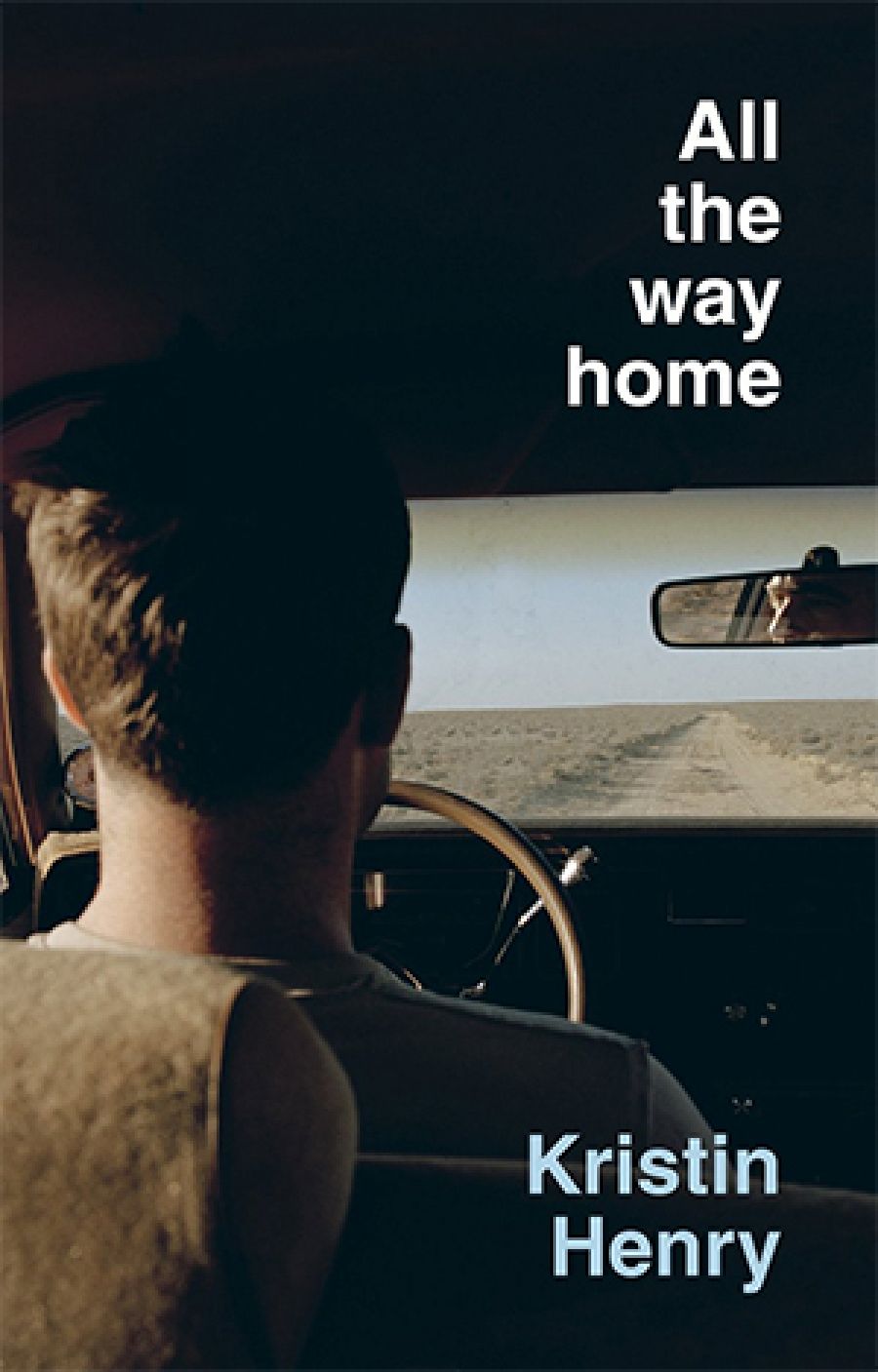
- Free Article: No
- Contents Category: Poetry
- Review Article: Yes
- Online Only: No
- Custom Highlight Text:
The cover of Kristin Henry’s verse novel All the Way Home shows a man at the wheel of a car, looking ahead at an endless dirt road. There is even a YouTube trailer for the book on the publisher’s website, with more driving. But in Henry’s book, as in all the best road movies, nobody ever seems to get anywhere.
- Book 1 Title: All the Way Home
- Book 1 Biblio: UWA Publishing, $24.95 pb, 187 pp, 9781742582825
The book’s central character, Jesse, is American, a drifter who grew up constantly on the move with his father after Jesse’s mother abandoned them, and who has learned to play the guitar that ‘…kept him company / in town after friendless town. / He never got closer to heaven / than when he made her sing.’ If that sounds like country music, it’s little wonder. The whole first section that introduces Jesse is pure Americana. Kristin Henry was born in Tennessee, grew up in the South, and moved often when young, so it all has the ring of truth, as well as being fabulously lyrical and concise.
When Jesse drifts to Australia, after his father’s death, things open out and flatten. He soon meets Flannery, his life’s love, and at this point things go slightly awry, for the reader at least. Flannery is from Northern Ireland, a former school teacher and refugee from the Troubles. She has amazingly red hair, green eyes, and white skin, all of which are Irish traits, but she has them in a slightly too emblematic way, and if there’s a song it’s not quite audible.
They meet in 1966, and she tells Jesse the last straw in Belfast was a car bomb that blew up the school bus and her pupils with it. This simply could not have happened that early, in fact not before 1972. Although this is not a history book, each section has a year at the start, so the timeline is clearly important to Henry. One doesn’t want to be too pedantic, and none of this really affects the narrative, but it does add to the feeling that Flannery, along with most of the other characters in the book apart from Jesse, is something of a cipher.
The heart of the story is the couple’s immersion in an idealistic commune called, a tad directively, Heartsong, where they find community, peace, and, in Jesse’s case, stability and a father figure. There are no dramatic twists or turns: the course their marriage and the commune’s fortunes run are naturally told and are all the more believable for it. It is the relationship between Jesse and the commune’s founder, Leon, that makes the book work, and that makes it a novel and not just a long succession of poems telling a story.
Jesse is always moving, solitary, until he meets Flannery, and finds his heart’s home. That is the romantic premise; but it is Leon, and Heartsong, that really hold him, give him purpose, and, in a tragic irony, let him turn away from people without having to leave them. They leave him, which is the pattern of his life, and the prism he sees it through. Mother left. Father died. Leon withdraws from the commune into solitude: Flannery goes back to Ireland, taking their daughter, Maille, with her.
Kristin Henry’s poetry, deceptively simple, lends itself to performance and to the recounting of seemingly mundane episodes that, in her poems, are never quite so straightforward. It is deceptively simple because so many would-be poets attempt it, and so few make it work: accessible and ineffable is a hard combination to pull off. Her poetry usually works on a personal level, as vignette, and this is the form of this book: a short poem on each page, for the most part, but more often functional and locomotive than revelatory.
The verse novel in Australia, as David McCooey has noted, tends towards either ‘minimalist’ or ‘maximalist’ modes, and Henry is firmly in the former camp. The verse is plain, constrained, and intelligible, its emotive purpose clear, in fact for the most part spelled out. Maximalist verse novels such as Alan Wearne’s, however leggy and demanding, do tend to have a kind of bustle that pushes them along. Minimalist works can go either way: express train, like Dorothy Porter, or slowly along a straight highway, like All the Way Home.
In this case, once the characters are established and the commune set up, actual events are few and far between. There is peaceful rural life, shading into the decay of idealism as society moves on. But in the foreground is Jesse, who, having once decided to stay still, becomes paralysed. His attachment to this immobility is what drives the actions of everyone around him.
The personal relationships, in their particulars, aren’t all that vivid or articulate, but at the critical moments Henry’s technique comes up trumps: ‘When there was nothing left to say / an eggshell calm surrounded them. / They understood / the fox would come tomorrow. / But that day / Flannery took her husband’s arm / and they walked exhausted / into the afternoon.’
Everyone seems to end up exactly where they started, with Jesse alone and rootless, Leon sad and guilty, and Flannery in a dream of Ireland. But, this book says, in the end that’s never the case: the world changes us, and we change it, and we are always elsewhere at the end.


Comments powered by CComment